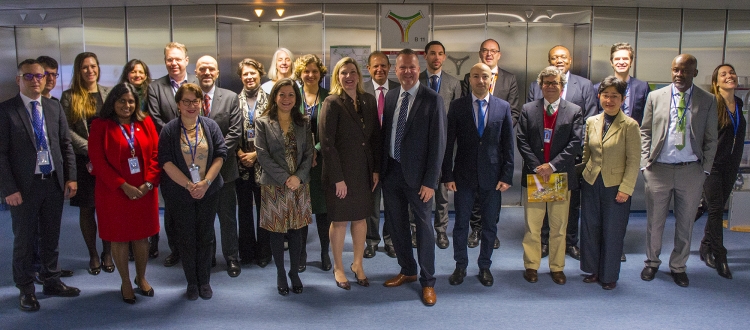Key partners working in cancer control have met last week in Vienna to finalise revisions to the methodology of 'imPACT Reviews' – a service that assesses the national cancer control capacities and needs of Member States. The meeting, convened by the IAEA and attended by representatives from the World Health Organization (WHO), the International Agency for Research on Cancer (IARC), the United Nations Office on Drugs and Crime and the Union for International Cancer Control, together with staff from across the IAEA working in cancer control, was held in follow up to an initial event in October 2018. Participants examined the current imPACT methodology and focused on identifying opportunities to strengthen collaboration with partners.
Lisa Stevens, Director of the IAEA’s Division of the Programme of Action for Cancer Therapy described the important role of imPACT Reviews for Member States as they advance their cancer control agenda. “I feel very strongly that this revised methodology will bring concrete and visible improvements to this service, more effective engagement with Ministries of Health and greater partner collaboration,” she said.
Beyond being a major health issue for individuals and government health authorities, cancer is also a development challenge for countries around the world. Data released by IARC in 2018 indicated that the number of people who developed cancer globally exceeded 18 million, with 9.6 million dying. By 2030, annual figures are projected to rise to 24 million cases, with 13 million deaths each year, of these over 70 percent of these deaths will occur in developing countries.
In a recorded message, Elisabete Weiderpass, Director of IARC said, “imPACT Reviews have been fundamental to strengthen cancer control in many countries. The 100th imPACT mission conducted in Burkina Faso has given an opportunity to reflect on how to ensure the continued relevance of imPACT Reviews.”
In addition to finalising the methodology for imPACT Reviews and examining how to support closer joint work with partners, the participants looked to identify ways to strengthen the process for follow-up actions by each organization to the imPACT recommendations and an exchange of information to existing and new cancer control activities, with the goal of achieving greater synergy and impact.
Asmus Hammerich, Director of Noncommunicable Diseases and Mental Health at the WHO Regional Office for the Eastern Mediterranean, said “There are great advantages in collaborating on research, publications and most especially resource mobilization. With good coordination, this can be done and will help bring great benefits for our Member States’ planning and delivery of cancer control services.”





